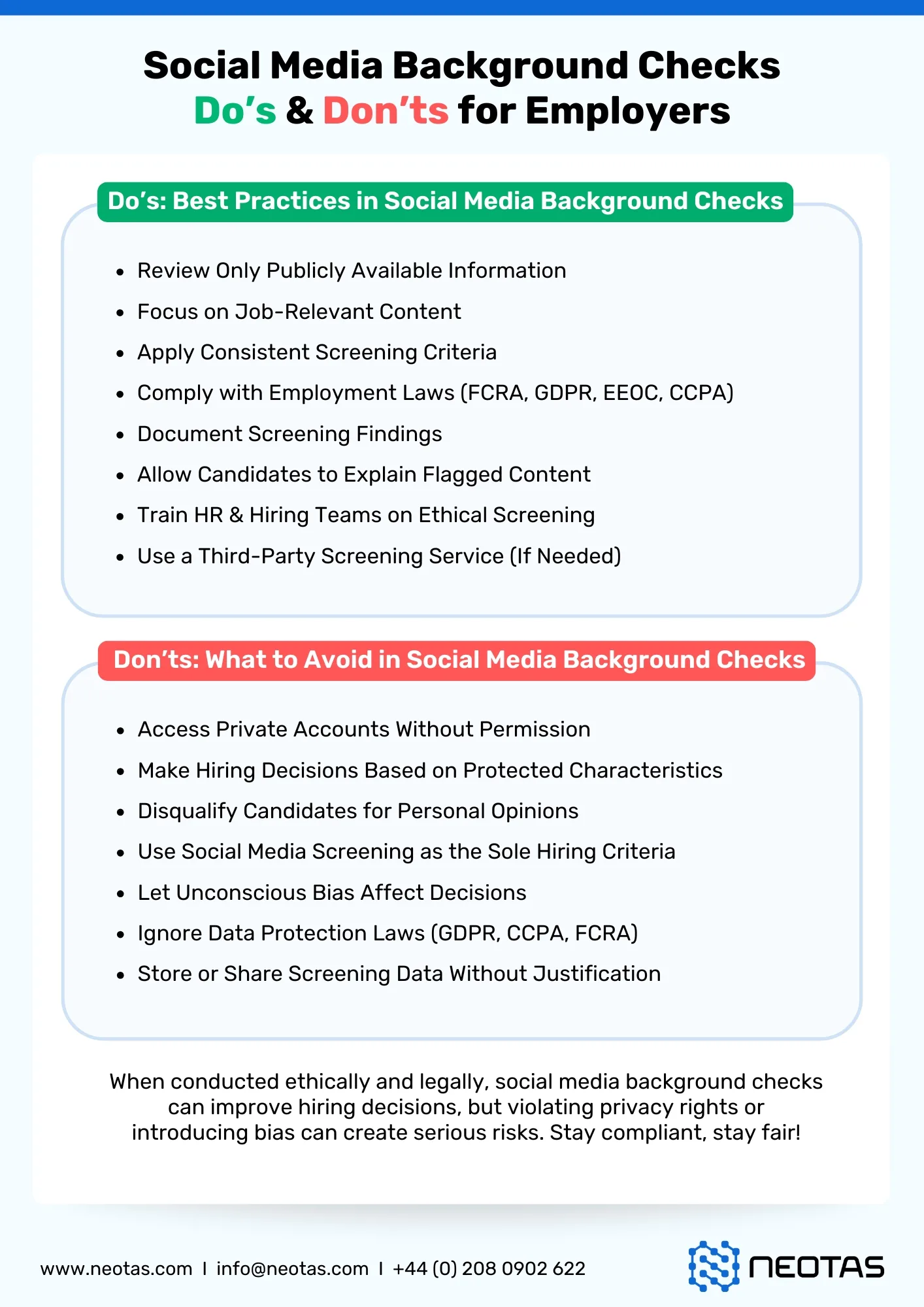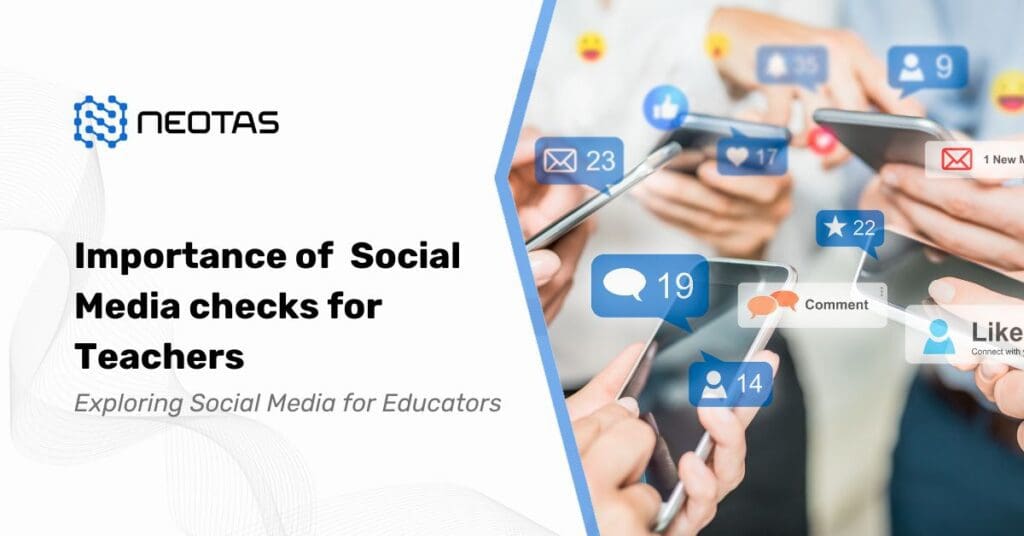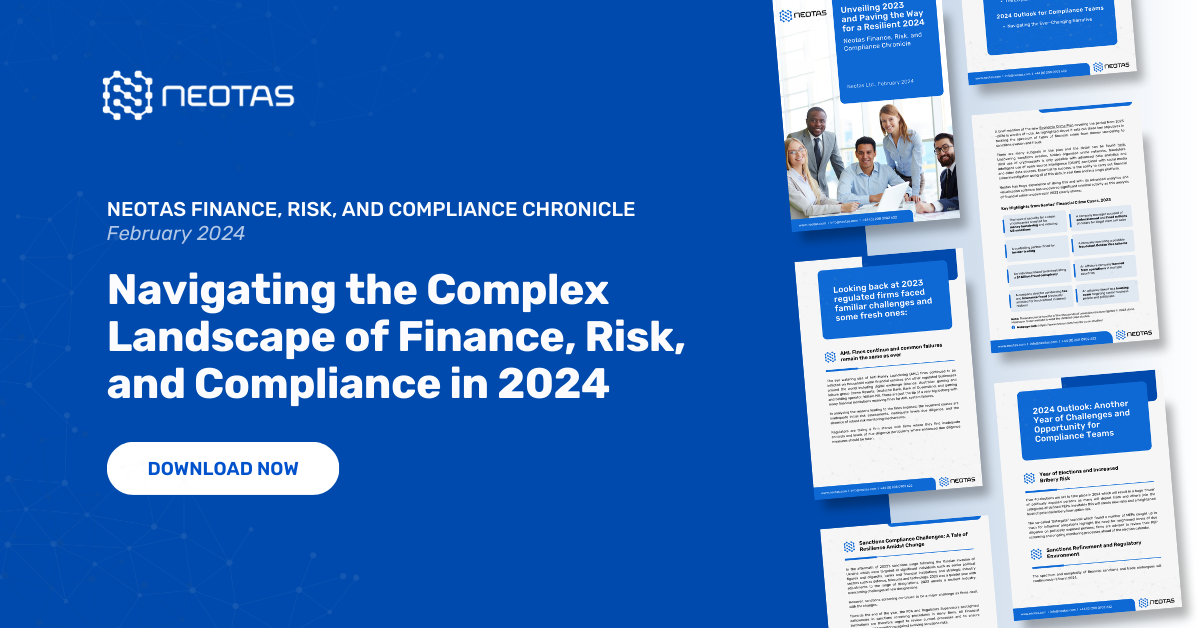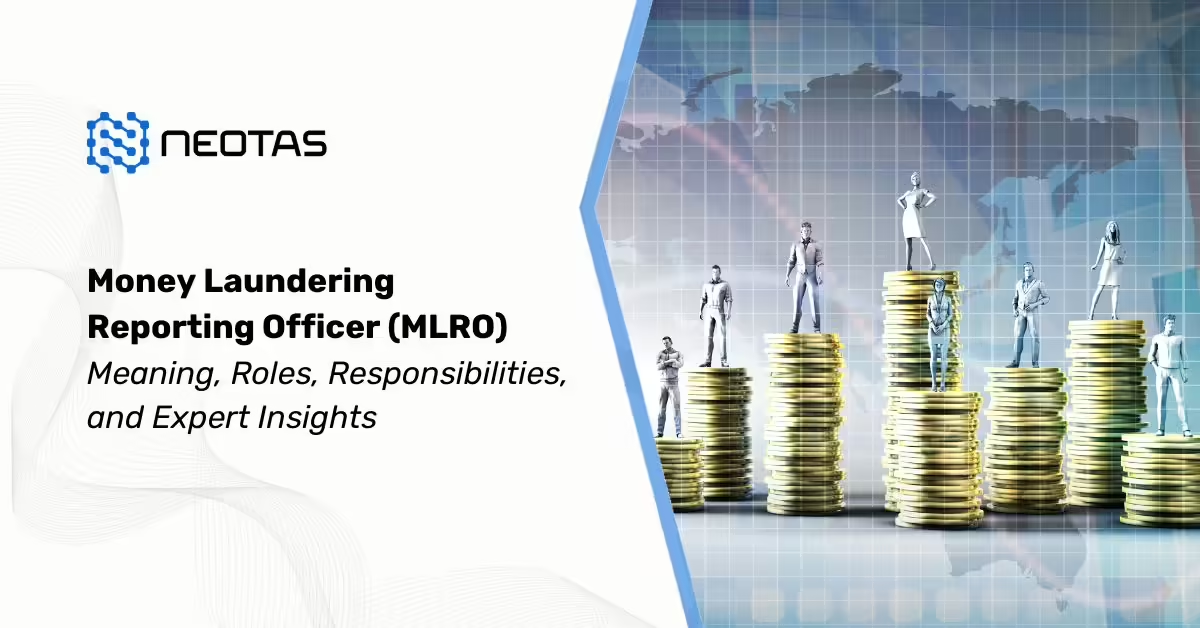Social Media checks for Teachers
Educational institutions are responsible for providing a safe, secure, and healthy learning environment. In today’s world, social media platforms have become an integral part of our daily lives. It is one of the most popular ways of communication used amongst people of different age groups, genders, and professions, especially teachers.
Teachers, as much as anyone else, use social media platforms like Facebook, Twitter, LinkedIn, and Instagram to connect with their peers, colleagues, and students. However, in recent years, there has been a growing concern about teachers’ social media activities and how it can affect the learning environment of their students. It is essential that this is addressed to ensure that teachers remain professional in their conduct and do not hurt the students’ learning environment.
Why Social Media checks for Teachers
Maintaining Professional Boundaries
The primary reason for carrying out Social Media checks for teachers is to ensure that they maintain appropriate boundaries between themselves and their students. Social media platforms are a massive repository of personal information, and teachers’ actions on these platforms can be very telling about their personalities, values, and potentially harmful behaviours. Although social media platforms have privacy settings, these settings are not a guarantee that all personal information and communication will remain private. Inadvertent sharing of private information or inappropriate interaction with students can have serious consequences.
Reputational Integrity
Another important reason for the Social Media checks of teachers is to ensure that their public behaviour doesn’t reflect poorly on their school’s reputation. Inappropriate photos, public rants, or posts that are not aligned with the school’s philosophy or values can have a damaging effect on the school’s reputation. The school is also responsible for ensuring that the students’ health and safety are not compromised by any action taken by the teachers.
Read our case study on Online Reputation Screening
Appropriate Communication
Social Media checks serve as a way to evaluate a teacher’s ability to teach and communicate effectively with their students. A teacher’s online presence can play an important role in determining their effectiveness as a teacher. It is important for teachers to communicate well with their students, both offline and online. Social media is an excellent way to keep students informed and updated about school events, assignments, and additional resources for learning. The teacher’s multimedia presence should be a reflection of their efforts in educating their students.
Appropriate Behaviour
Furthermore, social media checks ensure that teachers are not involved in any inappropriate behaviour or engaging in any activities that would compromise their ability to perform their duties. Instances of engaging in alcohol, drug use, or gambling could point to problematic past behaviours that might negatively affect the teacher-student interaction, thus compromising the learning environment or student safety. It is crucial to perform these checks to ensure that only the appropriate role models are teaching the students.
Prevention of Extremism
Another reason why social media checks should be carried out for teachers is to prevent them from networking with or aiding extremist groups and political organisations. Social media has played a significant role in shaping relationships and extremist groups’ networks in recent years. This has led to the recruitment of individuals into these extremist groups. It is critical to vet teachers and their online activity to ensure that they are not in any way involved in such groups or promoting extremist views. This would ensure that students are not exposed to extremist propaganda, violence, or hate speech.
Privacy and Safety
Social Media checks are necessary to protect the privacy and safety of students. The internet is home to cyber criminals and online predators who, given the chance, would take advantage of any personal information available. Teachers often have access to students’ personal information, which puts them in a vulnerable position for online predators. Carrying out Social Media checks can help to make sure these predators are not using online communication channels to contact and harm students. Moreover, it ensures that students’ personal data is kept confidential and not discussed on public forums.
Social media checks should be carried out for teachers to ensure that they are held to a high standard of professionalism in their teaching conduct while supporting the learning environment. Such checks can prevent inappropriate behaviour towards students, aid in evaluating the effectiveness of teachers, safeguard the school’s reputation, and ensure student privacy and safety.
Educational institutions are responsible for providing a safe, secure, and healthy learning environment, and carrying out social media checks is an important step in meeting that responsibility. As the use of social media continues to grow, teachers must understand how it can impact their professional and personal lives, while monitoring their digital lives accordingly. By doing so and carrying out regular Social Media Check-ups, the learning environment for students can remain safe, secure, and conducive to success.
Social Media Checks for School Staff
Social media background checks have become an essential part of the hiring process, safeguarding students, maintaining institutional reputation, and ensuring compliance with ethical and legal frameworks. This comprehensive guide explores the significance of social media checks for school staff, legal considerations, best practices, and the future of online screening in the education sector.
Social Media Background Checks
What Are Social Media Background Checks?
A social media background check is a process where a school or hiring entity reviews the social media activity of prospective and current employees to assess their professionalism, behavior, and alignment with institutional values. These checks help identify potential risks and red flags before employment decisions are made.
Read more about Social Media Background Checks
How Are They Different from Traditional Background Checks?
Unlike conventional background checks that focus on criminal records, education, and employment history, social media screening evaluates a candidate’s public online behavior, including posts, comments, affiliations, and shared content that could impact their suitability as an educator.
The Necessity of Social Media Checks in Schools
1. Ensuring Student Safety and Well-being
Teachers and school staff interact with students daily. Monitoring their online presence can help prevent exposure to inappropriate behavior, discrimination, or unethical conduct.
2. Upholding the Institution’s Reputation
Schools and academic institutions are held to high moral and ethical standards. A teacher’s online activity, if questionable, can harm the reputation of the institution.
3. Compliance with Legal and Ethical Standards
Many educational institutions are mandated by policies and regulations to conduct thorough background checks, including reviewing a candidate’s social media footprint.
Implementing Social Media Screening: Methods and Best Practices
Manual vs. Automated Screening
- Manual Screening: Reviewing social media profiles manually provides detailed insights but can be time-consuming and prone to bias.
- Automated Screening: AI-based tools analyze vast amounts of online data efficiently, offering objective and fast results.
Key Platforms to Monitor
- Facebook – Posts, group affiliations, comments
- Twitter/X – Tweets, retweets, public interactions
- Instagram – Visual content, captions, stories
- LinkedIn – Professional conduct, networking behavior
- TikTok – Trends, challenges, and potential inappropriate content
Identifying Red Flags
- Inappropriate Content – Hate speech, explicit images, or illegal activities
- Breaches of Confidentiality – Sharing student data or sensitive school information
- Affiliations with Extremist Groups – Content that reflects intolerance or criminal activities
- Unprofessional Behavior – Excessive profanity, negative remarks about previous employers, or inappropriate interactions with students
Legal and Ethical Considerations
Privacy Concerns
It is crucial to distinguish between public and private information. Schools should only review content that is publicly accessible and avoid intrusive monitoring of private accounts.
Anti-Discrimination Laws
Social media checks must align with Equal Employment Opportunity (EEO) laws, avoiding biases based on race, religion, or personal beliefs.
Data Protection Regulations
Schools must comply with legal frameworks such as:
- GDPR (General Data Protection Regulation) – Governing data privacy laws in the EU
- FERPA (Family Educational Rights and Privacy Act) – U.S. law protecting student data privacy
- State-Specific Regulations – Different U.S. states have laws regulating employer social media access
Developing a Social Media Policy for School Staff
Components of an Effective Policy
- Clearly Defined Acceptable Online Behavior
- Guidelines on Privacy Settings and Professionalism
- Policies on Engaging with Students Online
Training and Awareness
- Regular workshops on digital footprints
- Informing staff about potential risks and best practices
Enforcement and Consequences
- Schools must have transparent disciplinary measures in place for violations
Social media background checks for school staff are essential in modern hiring practices. They help protect students, uphold an institution’s reputation, and ensure compliance with legal and ethical standards. Schools must implement structured policies, adhere to regulations, and use ethical screening methods to conduct responsible social media vetting.
With the right approach, social media checks can create a safer and more professional educational environment while maintaining fairness and transparency in hiring decisions.
The Role of Third-Party Screening Services
Benefits of Outsourcing
- Expertise in social media analytics
- Objectivity in the screening process
- Time-saving for school administrators
Selecting a Reputable Service Provider
- Compliance with privacy laws
- Use of ethical screening practices
Social Media Background Checks Do’s & Don’ts for Employers

Neotas Social Media Background Checks and Social Media Screening
At Neotas, We understand the importance of conducting thorough and compliant Social Media Screening Checks, and our team of experts is dedicated to ensuring that the process is safe and reliable. Receive accurate and up-to-date information while complying with all relevant regulations, including GDPR and FCRA. Our advanced OSINT technology and human intelligence allow us to uncover valuable insights that traditional checks may miss.
Ready to experience the future of social media checks?
Schedule a call today! We highlight behavioural risks identified across social media profiles and the wider internet. Supplements the background screening process. Learn more about how we can help you conduct social media screening and background checks in a safe and compliant manner.
Related Content on Social Media Screening, Background Checks, and Social Media Background Check
- OSINT Background Check | What Makes Neotas Different?
- Social Media Background Checks For Education Industry
- Social Media Check For Teachers
- Social Media check for Lawyers and other legal professionals
- Social Media Check for doctors and healthcare specialists
- Social Media Check for Police Officers
- How Social Media Screening Benefits Our Clients
- AI-Based Social Media Checks Without Human Intervention
- Avoid the cost of a bad hire with online reputation screening
- The Truth About Social Media Screening And GDPR
- How GDPR and FCRA Apply to Social Media Background Checks — The Do’s and Don’ts of Social Media Background Checks for Employers
- Regulatory Compliance in Digital Screening: International view of the emerging Challenges and Opportunities
- Social Media Screening Webinar — Vero Screening X Neotas
- Neotas Online & Social Media Screening Video
- Pre-Employment Background Checks and Social Media Screening – What NOT To Do
- Online Reputation Screening Uncovers Piracy & Data Leak History For Candidate
- Pre Employment Social Media Screening Helps Firm Avoid Abusive Hiring Candidate



 Financial Crime Compliance Trends 2024
Financial Crime Compliance Trends 2024












